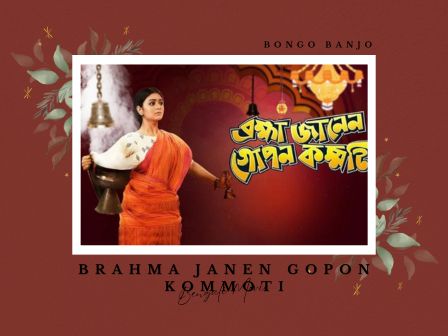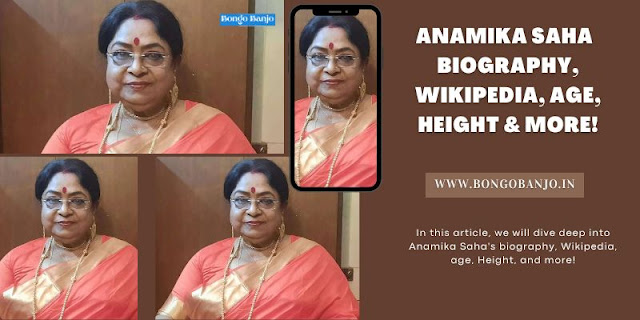Brahma Janen Gopon Kommoti Bengali Movie Review!
At Bongo Banjo, we strive to provide insightful and engaging reviews of contemporary movies that reflect the diversity and complexity of Indian society.
In this article, we focus on the recent Bengali film Brahma Janen Gopon Kommoti (2020), directed by Aritra Mukherjee and starring Ritabhari Chakraborty and Soham Majumdar.
We argue that this movie offers a nuanced exploration of the intersections between humour, feminism, and tradition, despite some flaws in execution and pacing.
By analyzing the main characters, plot, and themes of Brahma Janen Gopon Kommoti, we aim to demonstrate its artistic and social relevance and why it deserves more attention and appreciation.
Plot Summary and Key Characters
The plot of Brahma Janen Gopon Kommoti revolves around Shabari (Ritabhari Chakraborty), a young and independent woman who works as a lecturer in a college and also as a priestess in a temple.
Shabari believes that women can also perform religious rituals and chants, which are traditionally reserved for men and tries to break the patriarchal norms and prejudices of her community.
However, she faces resistance and criticism from some conservative and orthodox members of the temple, who question her knowledge and authority.
In parallel, Shabari meets and falls in love with a humble and supportive man named Aditya (Soham Majumdar), who respects her beliefs and aspirations.
The two main characters of Brahma Janen Gopon Kommoti, Shabari and Aditya, represent different facets of modern Indian society and the challenges and opportunities faced by women and men in balancing tradition and progress.
Shabari embodies the feminist spirit and courage to question and transform the status quo, while Aditya represents the empathetic and open-minded attitude necessary for genuine partnership and solidarity.
Both actors deliver convincing and nuanced performances that convey the emotional and intellectual depth of their characters.
Themes and Messages
The movie Brahma Janen Gopon Kommoti tackles several important themes and messages that resonate with the current socio-political context of India and beyond. Some of these themes are:
Feminism and gender equality: The movie highlights the need for empowering women to assert their rights and dignity, particularly in religious and cultural domains where they are often marginalized or excluded.
Shabari's struggle to challenge the norms of the temple and her own family reflects the broader struggle of women in India and other societies to claim their voice and space.
Humour and satire: The movie uses humour and satire as a means to critique the absurdities and hypocrisies of patriarchal and religious norms and to expose their contradictions and limitations.
Some of the funniest scenes in the movie involve Shabari's attempts to teach the priests and devotees of the temple about gender sensitivity and menstrual hygiene, which reveal the ignorance and discomfort of many men in facing these issues.
Romance and relationship: The movie portrays a refreshing and realistic depiction of a modern romance that transcends the usual stereotypes and cliches of Bollywood and Bengali movies.
Shabari and Aditya's relationship is based on mutual respect, trust, and affection, and avoids the usual melodrama and moralizing.
Their interactions are often humorous and light-hearted but also convey the deeper emotions and values that sustain their bond.
Strengths and Weaknesses
Brahma Janen Gopon Kommoti has several strengths that distinguish it from other movies in its genre and language. Some of these strengths are:
Bold and timely subject matter: The movie tackles a subject that is both socially relevant and artistically challenging, namely the empowerment of women in religious and cultural spheres.
This theme is still taboo in many parts of India and other societies, and the movie deserves credit for addressing it with sensitivity and humour.
Moreover, the movie offers a positive and inspiring portrayal of a young and educated woman who dares to challenge patriarchal norms and claim her right to equality and respect.
Engaging and nuanced performances: The two lead actors, Ritabhari Chakraborty and Soham Majumdar, deliver impressive and nuanced performances that add depth and authenticity to their characters.
Ritabhari Chakraborty especially shines in her portrayal of Shabari, conveying both the fierceness and vulnerability of a young woman who fights for her beliefs and feelings.
Soham Majumdar, on the other hand, provides a refreshing and understated performance as Aditya, which complements Ritabhari's energy and intensity.
However, the movie also has some weaknesses that may limit its appeal and impact. Some of these weaknesses are:
Overuse of preaching and didacticism: The movie sometimes feels too preachy and didactic, as if the director and writer were trying too hard to convey their message and point of view.
This is particularly evident in the scenes where Shabari lectures the priests and devotees of the temple, which may sound unrealistic and exaggerated to some viewers.
Moreover, the movie sometimes sacrifices subtlety and nuance for the sake of making a clear and strong statement, which may reduce its artistic value.
Uneven pacing and structure: The movie also suffers from some pacing and structural issues, which may affect its coherence and flow.
The first half of the movie, for instance, feels slower and less engaging than the second half, which focuses more on the romance and drama between Shabari and Aditya.
Moreover, the movie sometimes jumps between different subplots and characters without fully developing them, which may confuse or distract some viewers.
Conclusion and Implications
Overall, Brahma Janen Gopon Kommoti is a movie that deserves attention and discussion for its bold and timely subject matter, engaging and nuanced performances, and use of humour and satire to challenge patriarchal and religious norms.
Despite some flaws in execution and pacing, the movie offers a positive and inspiring message of female empowerment and equality, which resonates with the current socio-political context of India and beyond.
As such, we recommend this movie to anyone interested in exploring the complex and subtle layers of humour, feminism, and tradition in modern Indian cinema.
Read More: Ritabhari Chakraborty's Biography, Wikipedia, Age, Boyfriend & More!















